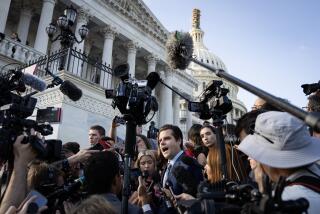McChrystal is out; Petraeus is in
President Obama relieved Army Gen. Stanley A. McChrystal of command in Afghanistan on Wednesday, replacing him with the architect of the Iraq troop buildup, Army Gen. David H. Petraeus, in a move meant to reassert the authority of the White House while ensuring the continuity of its war strategy.
In remarks in the Rose Garden, Obama said he was removing McChrystal with regret but believed that the general’s conduct had undermined civilian control of the military.
“War is bigger than any one man or woman, whether a private, a general or a president,” Obama said. “As difficult as it is to lose Gen. McChrystal, I believe it is the right decision for our national security.”
An article in Rolling Stone magazine this week quotes McChrystal and some of his aides making disparaging remarks about civilian leaders, including Obama and Vice President Joe Biden. The comments were widely denounced by military and political officials in Washington.
The choice of the popular Petraeus overcomes the biggest obstacle to removing McChrystal: the risk of a command vacancy that would slow down the Afghan campaign and force the administration to back off its overall timetable, which includes beginning troop withdrawals next summer.
Petraeus, as the head of Central Command overseeing U.S. forces in the Middle East, helped craft the current Afghanistan strategy with McChrystal and has been closely supervising it.
“The costs of replacing Gen. McChrystal at this point in the war were very high,” said John Nagl, a retired Army officer who helped Petraeus write the military’s authoritative counterinsurgency doctrine.
“But the president figured out a way to minimize the transaction costs, while simultaneously reaffirming his faith in the strategy.”
The comments quoted in Rolling Stone violate guidelines set by both Defense Secretary Robert M. Gates and Adm. Michael G. Mullen, chairman of the Joint Chiefs of Staff, that military leaders should keep advice private and defer to the civilian leadership.
Despite that, Gates had favored keeping McChrystal in place, said a government official who was not authorized to comment publicly and spoke on condition of anonymity.
Still, military officials close to McChrystal said, the general believed his fate was sealed Wednesday morning when he walked into a meeting with Obama.
The change in war leadership comes at a crucial time, with doubts growing among members of Congress and the American public about the nearly 10-year-long war and questions arising over the Afghan government’s commitment to the U.S. strategy.
But in some ways, the appointment of Petraeus could boost the war effort, because he is skilled in areas in which McChrystal and his team were struggling.
In Iraq, Petraeus was able to explain U.S. strategy to the public and to lawmakers on Capitol Hill, even at the beginning of the unpopular troop buildup as violence soared and the approach seemed to falter.
In Afghanistan, U.S. and allied forces have encountered setbacks in two primary campaigns this year, and President Hamid Karzai has voiced doubts about the U.S. commitment in the region.
The setbacks are particularly crucial because Obama’s withdrawal plan depends on success in the military campaign.
Officials said Petraeus was likely to use his upcoming Senate confirmation hearing to defend the policy of large-scale counterinsurgency he helped craft.
In Iraq, Petraeus also showed he was adept at forging relationships, both with Iraqi leaders and with U.S. diplomatic officials. During McChrystal’s command, U.S. relations with Karzai have been rocky and the U.S. military leadership has been at odds with American diplomatic leaders.
“If anything was a lesson from the Rolling Stone article it was that there was a dysfunctional set of relationships between the people who were supposed to be running the war,” said Richard Fontaine, a former advisor to Sen. John McCain, R-Ariz. “Petraeus has a history of working well with civilian leadership.”
Although the move is technically a step down in authority for Petraeus, Defense experts said the job of commanding the Western force in Afghanistan is considered the most important, hence prestigious, in the military. It is also a clear signal that the administration considers the Afghanistan conflict a more urgent priority than the war in Iraq that is continuing to draw down.
White House officials said Petraeus sought no promises or concessions to take the command.
Sen. Carl M. Levin (D-Mich.), chairman of the Senate Armed Services Committee, said he would hold a hearing on Petraeus’ nomination by Tuesday and predicted the general would be easily confirmed.
“For many reasons, Gen. Petraeus is a solid choice to take over in Afghanistan,” Levin said. “He provides strength and continuity. Indeed, he was the architect of the counter-insurgency strategy -- he literally wrote the book setting it out.”
Until Petraeus is confirmed, British Lt. Gen. Nick Parker will serve as the acting Commander of the North Atlantic Treaty Organization’s International Security Assistance Force. Lt. Gen. David Rodriguez, in charge of day-to-day operations, will serve as the acting commander of U.S. forces.
A little more than a year ago, McChrystal’s predecessor, Gen. David McKiernan, was replaced after Pentagon leaders decided he was not the right commander to reshape U.S. strategy in Afghanistan.
McChrystal arrived in Afghanistan with a new team of senior officers and dramatically retooled the Western coalition’s approach. He instituted new rules to curb civilian casualties and worked to improve relations with the Afghan government and people.
Long a respected Army officer, McChrystal won fame as the leader of the secret Joint Special Operations Command during the troop buildup in Iraq, credited with inflicting lasting damage on the insurgency there.
McChrystal made no remarks in Washington, but the U.S. military command issued an apology on his behalf from Kabul. In his statement, McChrystal said was committed to the coalition forces and he supported Obama’s strategy.
“It was out of respect for this commitment -- and a desire to see the mission succeed -- that I tendered my resignation,” McChrystal said.
In his Rose Garden remarks, Obama noted McChrystal’s long service and praised the general. It was only “with considerable regret,” he said, that he was replacing McChrystal.
The move showed Obama is intent on forcing a fractious team to work more closely together, and back the strategy he settled on last year without officials undercutting each other.
“I welcome debate among my team,” he said. “But I won’t tolerate division.”
christi.parsons
@latimes.com
Times staff writer Peter Nicholas in Washington contributed to this report.
More to Read
Get the L.A. Times Politics newsletter
Deeply reported insights into legislation, politics and policy from Sacramento, Washington and beyond. In your inbox three times per week.
You may occasionally receive promotional content from the Los Angeles Times.











